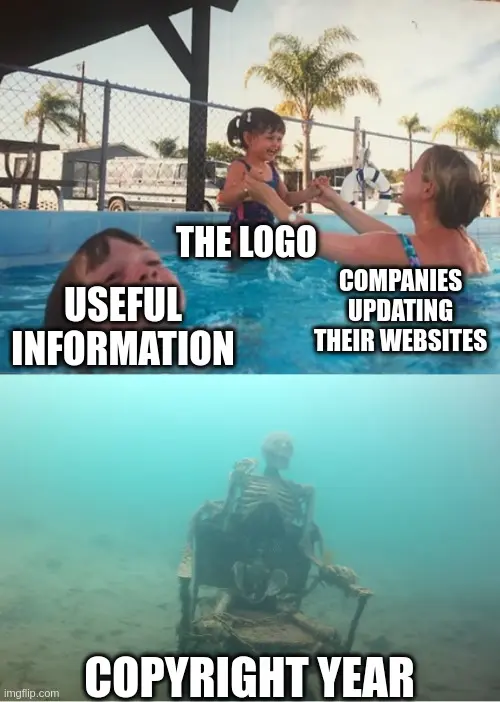this post was submitted on 11 Jul 2024
282 points (96.1% liked)
Programmer Humor
32710 readers
429 users here now
Post funny things about programming here! (Or just rant about your favourite programming language.)
Rules:
- Posts must be relevant to programming, programmers, or computer science.
- No NSFW content.
- Jokes must be in good taste. No hate speech, bigotry, etc.
founded 5 years ago
MODERATORS
you are viewing a single comment's thread
view the rest of the comments
view the rest of the comments

I'm not any type of lawyer, especially not a copyright lawyer, though I've been informed that the point of having the copyright date is to mark when the work (book, website, photo, etc) was produced and when last edited. Both aspects are important, since the original date is when the copyright clock starts counting, and having it further in the past is useful to prove infringement that occurs later.
Likewise, each update to the work imbues a new copyright on just the updated parts, which starts its own clock, and is again useful to prosecute infringement.
As a result, updating the copyright date is not an exercise of writing today's year. But rather, it's adding years to a list, compressing as needed, but never removing any years. For example, if a work was created in 2012 and updated in 2013, 2015, 2016, 2017, and 2022, the copyright date could look like:
To be clear, I'm not terribly concerned with whether large, institutional copyright holders are able to effectively litigate their IP holdings. Rather, this is advice for small producers of works, like freelancers or folks hosting their own blog. In the age of AI, copyright abuse against small players is now rampant, and a copyright date that is always the current year is ammunition for an AI company's lawyer to argue that they didn't plagiarize your work, because your work has a date that came after when they trained their models.
Not that the copyright date is wholly dispositive, but it makes clear from the get-go when a work came unto copyright protection.
If a work is updated every year between 2020 and 2024 (2020,2021,2022,2023,2024) would it be valid to write 2020-2024?
If there were changes in 2020 to 2024 inclusive, then yes, I'd write it as 2020-2024. But if not inclusive, then I'd write 2021-2023.
Thank you.